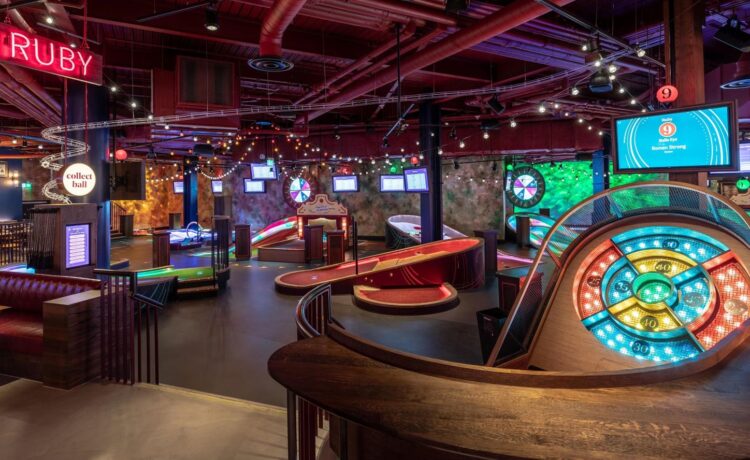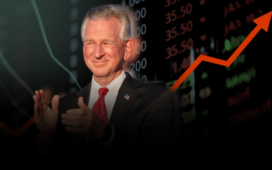Puttshack is one of Emerging’s investments – a reimagined game of mini golf– pairing modern … [+]
In the rapidly evolving world of hospitality, technology and innovation are driving major shifts, and few understand this transformation better than Mathew Focht. As a co-founder of Emerging, a fund focused on tech-driven concepts in hospitality, Focht brings decades of expertise to the table. In this interview, he shares his insights on the future of “eatertainment,” the evolving role of technology, and what it takes to identify and scale the next big idea in the experiential economy. I sat down with Focht to discuss how Emerging’s strategic investments are shaping the future of hospitality and the key factors that drive success in this high-growth industry.
Dave Knox: Let’s start with an overview of Emerging before diving into the story and areas you’re exploring.
Mathew Focht: Absolutely. At Emerging, we invest in two key areas: technology in hospitality and tech-enabled concepts. These are industries we’ve worked in for decades, and we were fortunate to launch a fund last year. We have 50 CEOs and founders—leaders in hospitality—who have joined us as investors and advisors. Our goal is to support early-stage entrepreneurs driving technology in the experiential economy.
Knox: Your background in entertainment and experiential industries is impressive. What led you to launch an investment fund in this space?
Focht: It all goes back to my roots in Cincinnati. I started as a civil engineer working for a developer, Steiner & Associates, on Easton Town Center. I became fascinated with restaurant and entertainment operators, particularly how they selected real estate—often based on instinct rather than data. As an engineer, I saw an opportunity to introduce data-driven decision-making to these highly entrepreneurial operators. Over time, I built relationships with top-tier restaurateurs behind brands like Bravo Brio, Cheesecake Factory, and Cameron Mitchell Restaurants.
Later, I moved to New York, structuring deals that connected innovative hospitality groups with landlords of billion-dollar projects. Eventually, my partner John Davie and I launched a supply chain company, Consolidated Concepts, in 2008. Now part of Buyers Edge Platform, we provide data intelligence for one in three U.S. restaurants, helping operators cut distribution costs and gain insights. This real-time market intelligence naturally led us to launch a fund, leveraging our expertise in tech and hospitality. We understand industry gaps better than most, and we identify where market demand is strongest. That’s why we’ve backed concepts like Puttshack from the Topgolf founders and the upcoming F1 Arcade.
Knox: The restaurant industry has evolved significantly. Now we see the rise of technology, “eatertainment,” and “sportstainment.” How do you see the industry evolving, and what do you look for in investment opportunities?
Focht: The industry is exploding. The digitalization of hospitality is an $8 billion market today, projected to reach $30 billion by 2030. Labor is the biggest challenge operators face, with rising wages driving demand for automation. AI and robotics will become more prevalent in restaurants within the next three years.
At Buyers Edge, we recently held a hackathon with 80 developers to explore hands-free ordering via Google Glass. Imagine a chef walking through the kitchen, making inventory-based orders without touching a computer. These innovations will transform operations, and we’re at the forefront of driving them. We are also seeing significant advancements in guest experience technology, from AI-powered reservations to dynamic pricing models that optimize revenue based on demand.
Knox: What’s your formula for identifying winning concepts?
Focht: We get that question a lot. Over decades of working with high-growth brands, we’ve identified key factors:
- Proprietary Moat: Can the concept be easily copied? If it can, competitors will flood the space—like what happened with hot chicken concepts. We prefer tech-enabled concepts with built-in defensibility, like Puttshack’s patented GPS and Bluetooth-enabled golf balls or Bat Box, which leverages South Korean technology with protected U.S. patents.
- Pricing Power: Does the offering command a premium price? Experiences that justify higher spending stand out. Great food and beverage execution are crucial—people don’t want to visit a separate restaurant before or after an entertainment venue. Our investments feature elevated dining and drinks, which drive strong margins.
- Customer Frequency: How often will customers return? Some entertainment concepts attract visitors only once a year. We look for those with a return rate of 1.5+ visits annually—nowhere near McDonald’s 50 visits per year but strong enough for expansion.
- Operational Scalability: Can the concept be replicated efficiently? The best businesses have processes and technology that allow for smooth scaling without sacrificing quality.
Knox: Historically, restaurant founders were often chefs. How has the profile of founders changed in today’s tech-driven, entertainment-infused space?
Focht: Founders today are running much more complex businesses. In the past, an operator with one to six locations could survive without strong management skills. Now, even early-stage entrepreneurs need structured leadership. A single misstep in the first two units can be fatal.
That’s why Emerging plays a critical role. We provide mentorship through our network of 50 CEOs and founders, ensuring these entrepreneurs have the right team in place. Our ecosystem is designed to help them scale while maintaining quality and differentiation.
Knox: Your fund is hands-on, but you also have a network of industry leaders. How do they support the founders you invest in?
Focht: We hold monthly meetings on the second Thursday of each month, where our advisory team—including CEOs and industry experts—reviews investment opportunities. If we move forward, we create a playbook, outlining a one- to three-year execution plan.
For concepts, our real estate team, Emerging Concepts, identifies high-potential locations nationwide before we commit capital. On the technology side, we leverage our Buyers Edge relationships, testing solutions with over 1,000 restaurant chains before investing. Our edge is helping founders accelerate their go-to-market strategy while mitigating risks.
Additionally, our network allows entrepreneurs to access talent, suppliers, and operational best practices that would otherwise take years to develop on their own. We also facilitate introductions to strategic partners, including landlords, developers, and corporate clients.
Knox: Your investments target concepts where customers return a few times a year rather than weekly. How does that impact marketing?
Focht: These are experiential concepts with much higher check averages—typically $25–$35 per person, compared to McDonald’s $5. Guests stay for 90 minutes or more, making visits more occasional but highly planned.
Marketing must be sophisticated. Our concepts attract multiple customer types—birthday parties, corporate events, happy hours, date nights. Corporate business alone can account for 15–50% of revenue. You need a top-tier CMO to manage this complexity; you can’t just open your doors and expect success. Digital marketing, social media engagement, and targeted outreach play crucial roles in sustained brand awareness and conversion.
Knox: When should a founder know Emerging is the right partner for them?
Focht: Most of our investments come through word of mouth. The companies we back are usually oversubscribed—they don’t need our money. Instead, they prioritize our involvement because of our strategic value.
We’re minority investors, often holding 5–25% stakes, but we’re on the board of 9 out of 14 investments—not because we’re the biggest investors but because we help drive strategic growth. Our operating companies work with these brands daily, leveraging our deep industry expertise. Emerging is more than capital; we’re a partner in building sustainable, high-growth businesses.
Ultimately, we want to work with founders who are deeply passionate about their businesses and open to collaboration. Those who seek strategic guidance, industry connections, and operational expertise beyond just funding will find immense value in partnering with us.





